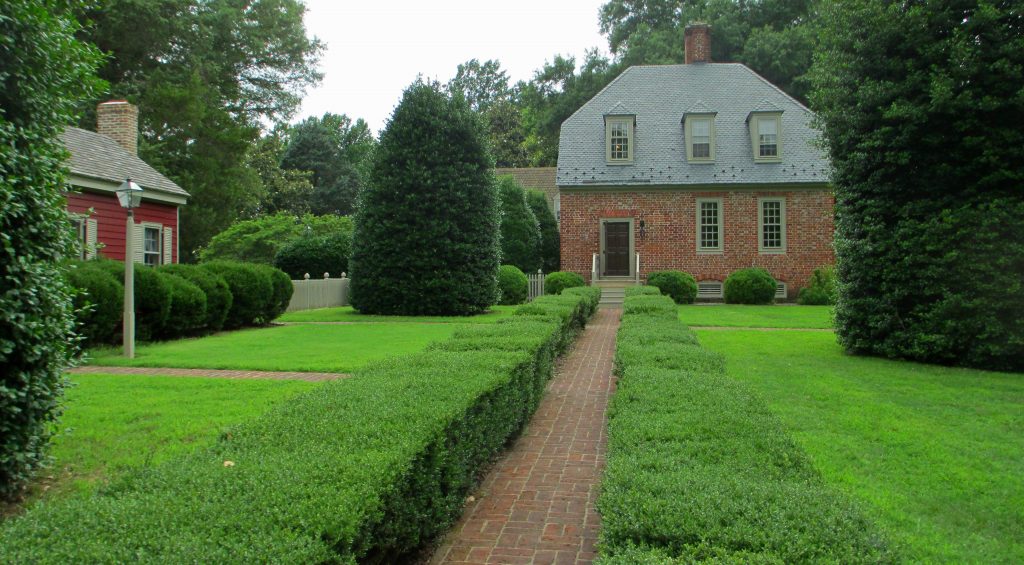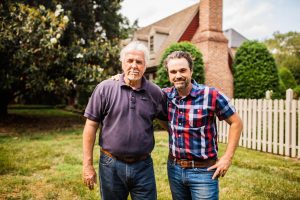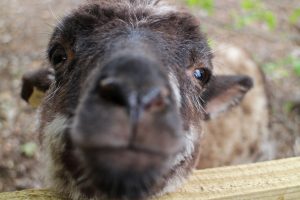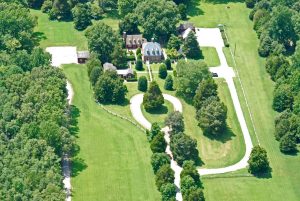A colonial-era home in King William County is getting a new life that will bring weddings and a rare breed of sheep to the property.
The 107-acre Seven Springs estate, featuring an early 18th-century house that’s considered the first brick house in the county, is being converted into an event venue while also serving as a farm for Hog Island sheep, the only breed of sheep considered native to Virginia.
Robert and Brett Hunnicutt, the father-and-son team behind Richmond firm Hunnicutt Construction, purchased the property in February for $1.1 million, according to county records.
In the months since, they have added wooden fencing and a barn for the sheep and touched up the home’s interior and lighting to make it fit for hosting weddings and other events, such as farm-to-table dinners and school field trips.
Located about 25 miles from Richmond, the property has a capacity for 350 people and can sleep up to 20 between the main house and a guest house. Brett Hunnicutt said the property has already served as a substitute venue for one wedding and is on track to host more events beginning in September.
“My father and I have always been interested in historic properties,” Hunnicutt said. “Knowing people in the wedding business, I decided an event venue is something I would like to try to do.”
The 37-year-old Hunnicutt has brought on Brittney Schopen as the property’s venue manager. Most recently with Richmond-based Wood Grain & Lace Events, Schopen was a planner for Hunnicutt’s brother’s wedding and had previously worked with Christine Greenberg of Urban Set Design, who was brought on as a consultant.
On the farm side, Hunnicutt is working with Josiah Lockhart of Lockhart Family Farm in Caroline County. The Lockharts raise rare and heritage breed animals, including Hog Island sheep, which Lockhart said are gaining popularity with adventurous chefs in Richmond’s restaurant scene.
Lockhart said such demand for the breed’s meat provides an incentive to increase its numbers, which have dwindled since the sheep were moved off Hog Island, a barrier island on Virginia’s Eastern Shore where the breed thrived for centuries, separated from predators. The Livestock Conservancy lists the breed’s status as critical.
“Eating them is an important part to saving them,” Lockhart said.
Seven Springs’ flock, which totals about 50 and which Hunnicutt and Lockhart plan to triple over time, adds to other flocks at historical sites such as Mount Vernon and Colonial Williamsburg.
“The Hog Island sheep are a colonial-era animal, which is a perfect tie-in with this property,” Hunnicutt said. “Before we purchased it, we came to the decision that we wanted some type of livestock out here, because we thought it would add an element to the property, even if it was just for something pretty to look at.
“The more I met with Josiah and the more we talked about different opportunities, the more I realized it was going to go much further than that and would become something where we could incorporate animals into the farm-to-table dinners or the ‘dinners in the field.”
Hunnicutt, a member of the fledgling Richmond Food Co-op, said he plans to add more heritage breed animals and an heirloom vegetable garden on the property and is looking for a partner for that, as well.
Dating back to sometime between 1725 and 1740, the Seven Springs house appears much the same as it did when it was built for Capt. George Dabney I, who served as a member of the county court and as its first sheriff, according to the U.S. Department of the Interior, which lists Seven Springs on the National Register of Historic Places.
A description on the property’s DOI nomination form describes the two-story house as a “striking and unusual specimen” of an 18th-century architectural style called “Tidewater domestic.” The first floor features a four-room floorplan with a central chimney design, described as “one not found in any other known Virginia house.” A winding staircase leads to the second floor, and a downstairs basement provides additional rooms.
A later addition to the house and a separate guest house add numerous bedrooms and spaces that can be used for wedding parties and guests. While he expects Seven Springs will primarily attract weddings, Hunnicutt said he’s marketing the site for a variety of events, such as corporate retreats, fundraisers and field trips for youth groups.
“The wedding piece is a big piece of it, but we’re going to try to do quite a few community events, as well,” Hunnicutt said.
The Colonial Williamsburg Foundation, which briefly owned Seven Springs through a bequest of previous owner Harry Coon, also oversaw a renovation and remodeling that Coon undertook in the early 1980s.
“It’s in really great shape,” Hunnicutt said of the house. “There hasn’t always been a lot of people here, so through the extensive renovation they did in the early ‘80s – and it’s of such high quality construction – it’s really withstood the test of time.”
On top of the purchase price, Hunnicutt said he has spent upwards of $100,000 on the barn and fencing, which were built by Martin & Hancock Construction in Mechanicsville.
The Hunnicutts purchased the property from Ken and Sue Moffet, a couple from Texas whose name is similar to that of previous owners: Mr. and Mrs. H. D. Moffett, who are mentioned in the nomination form. Hunnicutt said the similarity is purely coincidence.
The property had been vacant from 1940 to 1967 before the Moffetts purchased it and began a restoration that Coon would later finish.
While he doesn’t foresee opening the property to public tours, Hunnicutt said the events to be held there will be the start of a new chapter in the history of Seven Springs.
“It’s always been a private residence,” he said. “This is the first time it’s been opened to the public.”
A colonial-era home in King William County is getting a new life that will bring weddings and a rare breed of sheep to the property.
The 107-acre Seven Springs estate, featuring an early 18th-century house that’s considered the first brick house in the county, is being converted into an event venue while also serving as a farm for Hog Island sheep, the only breed of sheep considered native to Virginia.
Robert and Brett Hunnicutt, the father-and-son team behind Richmond firm Hunnicutt Construction, purchased the property in February for $1.1 million, according to county records.
In the months since, they have added wooden fencing and a barn for the sheep and touched up the home’s interior and lighting to make it fit for hosting weddings and other events, such as farm-to-table dinners and school field trips.
Located about 25 miles from Richmond, the property has a capacity for 350 people and can sleep up to 20 between the main house and a guest house. Brett Hunnicutt said the property has already served as a substitute venue for one wedding and is on track to host more events beginning in September.
“My father and I have always been interested in historic properties,” Hunnicutt said. “Knowing people in the wedding business, I decided an event venue is something I would like to try to do.”
The 37-year-old Hunnicutt has brought on Brittney Schopen as the property’s venue manager. Most recently with Richmond-based Wood Grain & Lace Events, Schopen was a planner for Hunnicutt’s brother’s wedding and had previously worked with Christine Greenberg of Urban Set Design, who was brought on as a consultant.
On the farm side, Hunnicutt is working with Josiah Lockhart of Lockhart Family Farm in Caroline County. The Lockharts raise rare and heritage breed animals, including Hog Island sheep, which Lockhart said are gaining popularity with adventurous chefs in Richmond’s restaurant scene.
Lockhart said such demand for the breed’s meat provides an incentive to increase its numbers, which have dwindled since the sheep were moved off Hog Island, a barrier island on Virginia’s Eastern Shore where the breed thrived for centuries, separated from predators. The Livestock Conservancy lists the breed’s status as critical.
“Eating them is an important part to saving them,” Lockhart said.
Seven Springs’ flock, which totals about 50 and which Hunnicutt and Lockhart plan to triple over time, adds to other flocks at historical sites such as Mount Vernon and Colonial Williamsburg.
“The Hog Island sheep are a colonial-era animal, which is a perfect tie-in with this property,” Hunnicutt said. “Before we purchased it, we came to the decision that we wanted some type of livestock out here, because we thought it would add an element to the property, even if it was just for something pretty to look at.
“The more I met with Josiah and the more we talked about different opportunities, the more I realized it was going to go much further than that and would become something where we could incorporate animals into the farm-to-table dinners or the ‘dinners in the field.”
Hunnicutt, a member of the fledgling Richmond Food Co-op, said he plans to add more heritage breed animals and an heirloom vegetable garden on the property and is looking for a partner for that, as well.
Dating back to sometime between 1725 and 1740, the Seven Springs house appears much the same as it did when it was built for Capt. George Dabney I, who served as a member of the county court and as its first sheriff, according to the U.S. Department of the Interior, which lists Seven Springs on the National Register of Historic Places.
A description on the property’s DOI nomination form describes the two-story house as a “striking and unusual specimen” of an 18th-century architectural style called “Tidewater domestic.” The first floor features a four-room floorplan with a central chimney design, described as “one not found in any other known Virginia house.” A winding staircase leads to the second floor, and a downstairs basement provides additional rooms.
A later addition to the house and a separate guest house add numerous bedrooms and spaces that can be used for wedding parties and guests. While he expects Seven Springs will primarily attract weddings, Hunnicutt said he’s marketing the site for a variety of events, such as corporate retreats, fundraisers and field trips for youth groups.
“The wedding piece is a big piece of it, but we’re going to try to do quite a few community events, as well,” Hunnicutt said.
The Colonial Williamsburg Foundation, which briefly owned Seven Springs through a bequest of previous owner Harry Coon, also oversaw a renovation and remodeling that Coon undertook in the early 1980s.
“It’s in really great shape,” Hunnicutt said of the house. “There hasn’t always been a lot of people here, so through the extensive renovation they did in the early ‘80s – and it’s of such high quality construction – it’s really withstood the test of time.”
On top of the purchase price, Hunnicutt said he has spent upwards of $100,000 on the barn and fencing, which were built by Martin & Hancock Construction in Mechanicsville.
The Hunnicutts purchased the property from Ken and Sue Moffet, a couple from Texas whose name is similar to that of previous owners: Mr. and Mrs. H. D. Moffett, who are mentioned in the nomination form. Hunnicutt said the similarity is purely coincidence.
The property had been vacant from 1940 to 1967 before the Moffetts purchased it and began a restoration that Coon would later finish.
While he doesn’t foresee opening the property to public tours, Hunnicutt said the events to be held there will be the start of a new chapter in the history of Seven Springs.
“It’s always been a private residence,” he said. “This is the first time it’s been opened to the public.”




Find out more information at http://www.SevenSpringsVA.com
With Robert & Brett Hunnicutt owning this property — it is in good hand. Beautiful place!
Truly a rare, exquisite property. The Hunnicutt’s are equally a class act. Thanks for the opportunity to create many memories at Seven Springs.